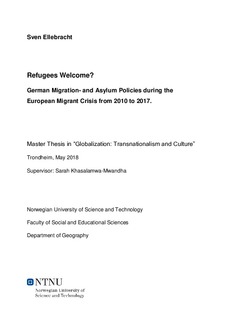| dc.contributor.advisor | Khasalamwa-Mwandha, Sarah | |
| dc.contributor.author | Ellebracht, Sven | |
| dc.date.accessioned | 2018-07-31T07:56:49Z | |
| dc.date.available | 2018-07-31T07:56:49Z | |
| dc.date.issued | 2018 | |
| dc.identifier.uri | http://hdl.handle.net/11250/2506919 | |
| dc.description.abstract | The topic of this study is the practical usage of migration policies by the German government during the refugee crisis from 2010 to 2017. The study searches for possible changes in how refugees were viewed legally and practically and which political groups might have influenced these changes. The findings lead to the conclusion that the German government was mostly aiming for a rather reluctant position in the refugee crisis. This position was forced to be abandoned in favour of a more engaging position in order to save the structure of the EU, while still trying to regain a more distant position again. Most of the direct changes in the government did not happen because of actual change in its opinions, but rather due to external influences, such as geopolitical changes in Europe, mood swings in the German public and pressure from different political groups. Visible interests in the actions of the German government were that of border control, economic benefits, international stability and humanitarian concerns. | nb_NO |
| dc.language.iso | eng | nb_NO |
| dc.publisher | NTNU | nb_NO |
| dc.title | Refugees welcome? : German migration- and asylum policies during the European migrant crisis from 2010 to 2017 | nb_NO |
| dc.type | Master thesis | nb_NO |
| dc.subject.nsi | VDP::Samfunnsvitenskap: 200::Samfunnsgeografi: 290 | nb_NO |
